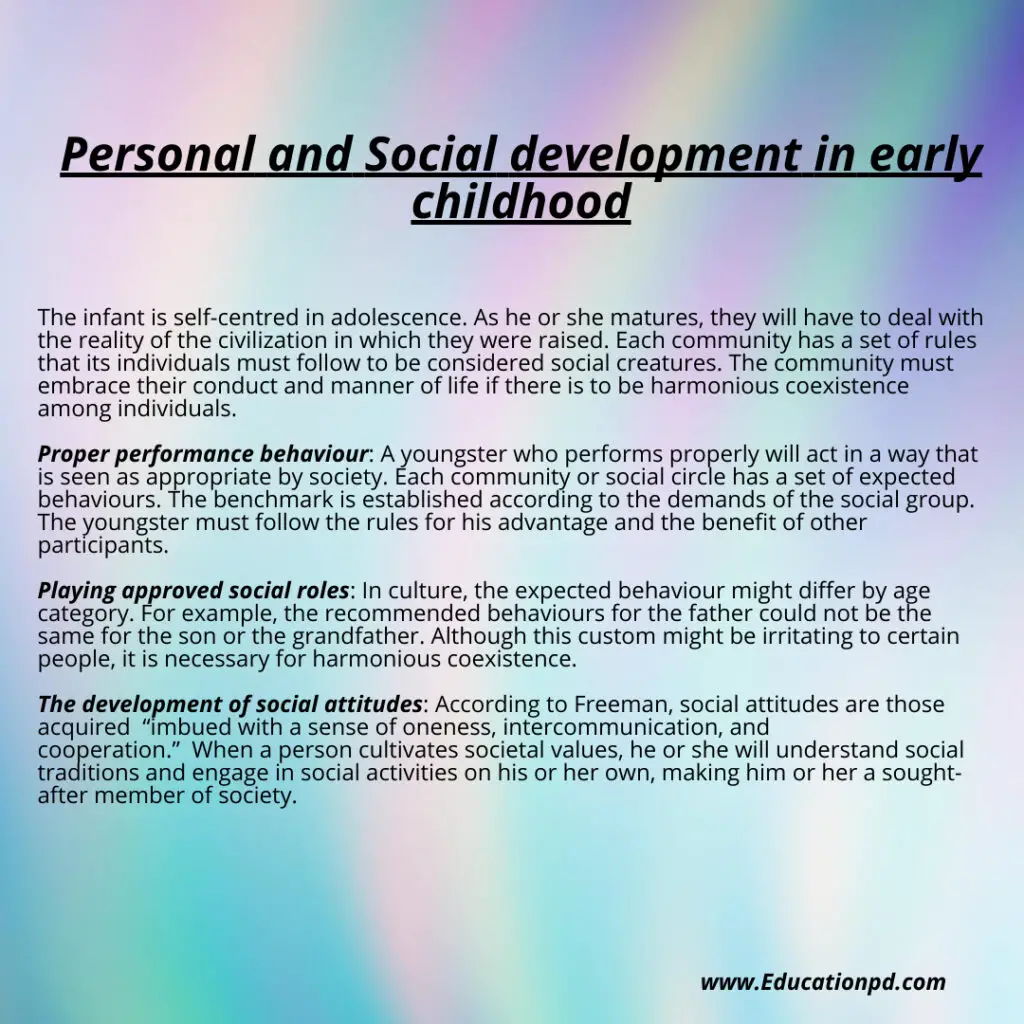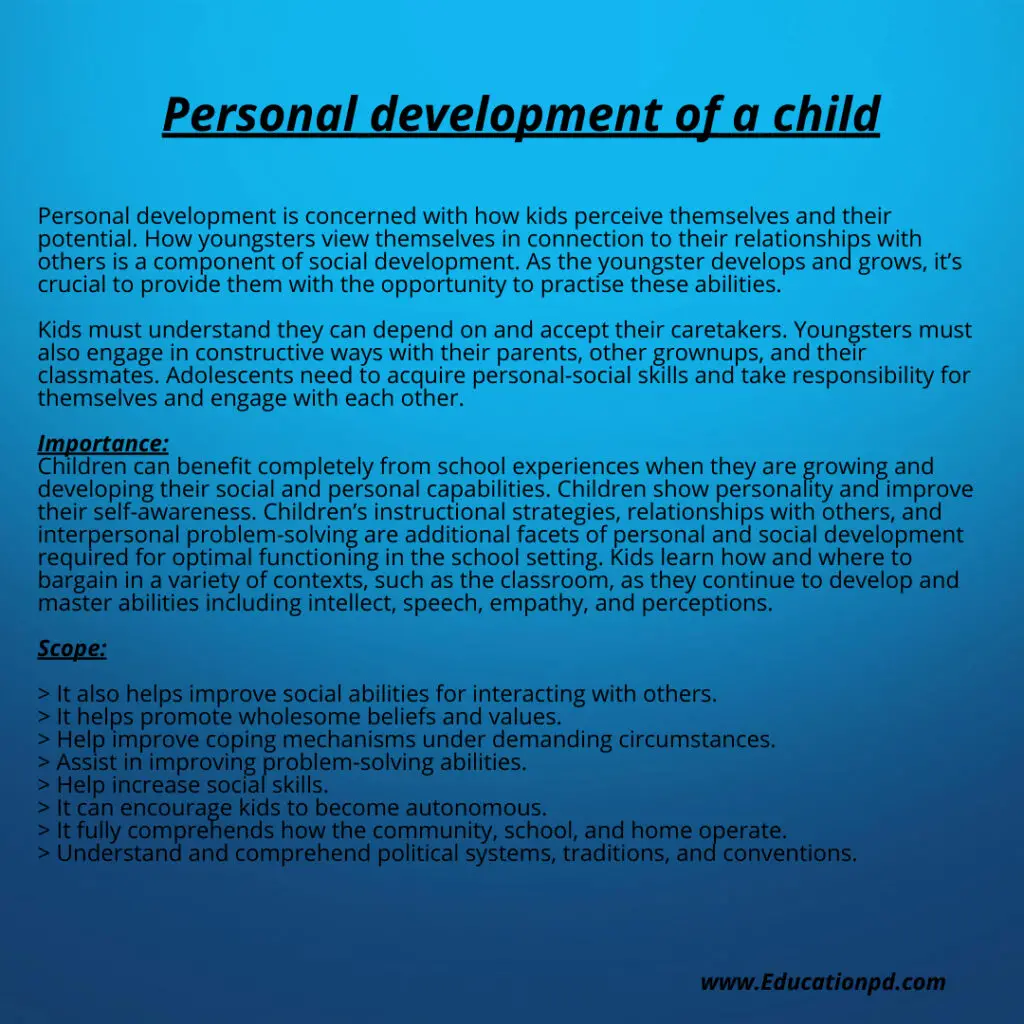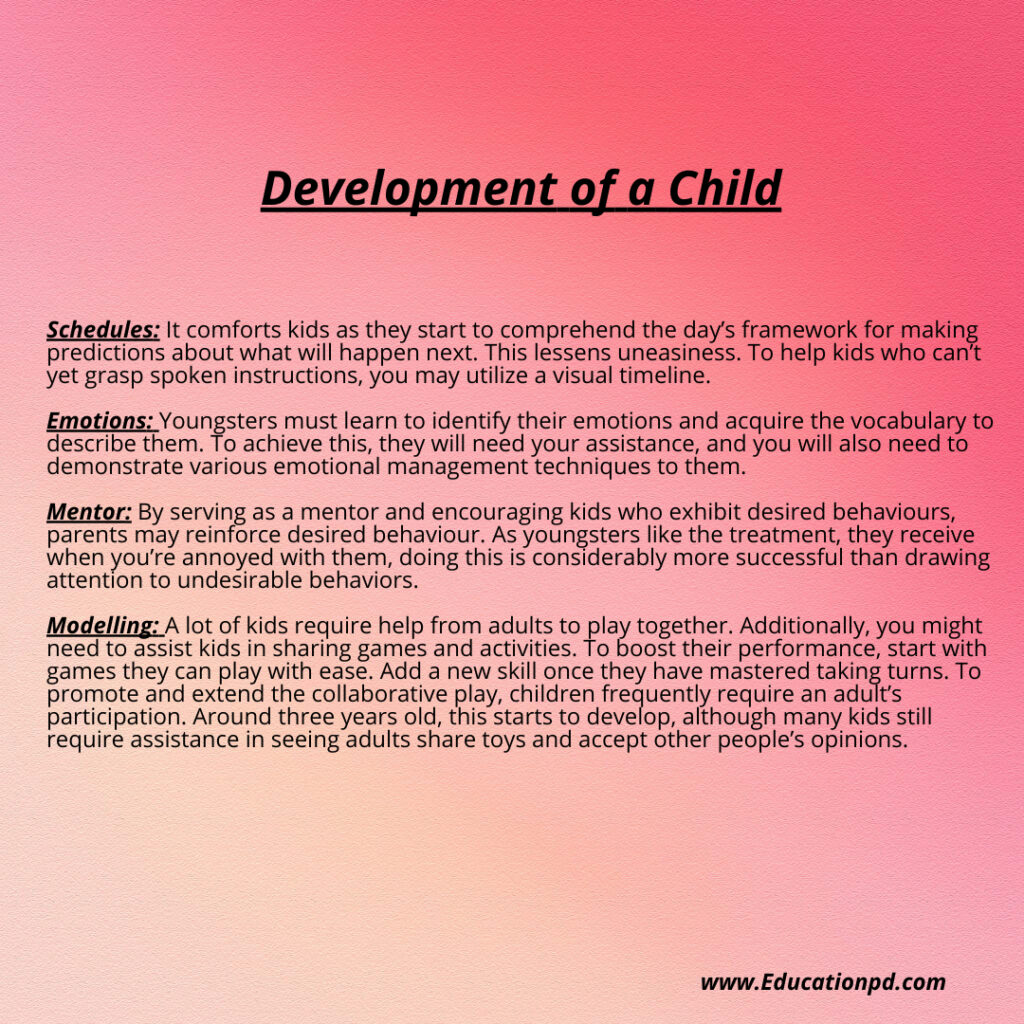Back to: Early Childhood Care and Education B.ed Notes, IGNOU Notes, M.A Notes, Graduation Notes
Personal and Social development in early childhood
The infant is self-centred in adolescence. As he or she matures, they will have to deal with the reality of the civilization in which they were raised. Each community has a set of rules that its individuals must follow to be considered social creatures. The community must embrace their conduct and manner of life if there is to be harmonious coexistence among individuals.
Hurlock claims that there are three socialization stages. They are:
- Proper performance behaviour: A youngster who performs properly will act in a way that is seen as appropriate by society. Each community or social circle has a set of expected behaviours. The benchmark is established according to the demands of the social group. The youngster must follow the rules for his advantage and the benefit of other participants.
- Playing approved social roles: In culture, the expected behaviour might differ by age category. For example, the recommended behaviours for the father could not be the same for the son or the grandfather. Although this custom might be irritating to certain people, it is necessary for harmonious coexistence.
- The development of social attitudes: According to Freeman, social attitudes are those acquired “imbued with a sense of oneness, intercommunication, and cooperation.” When a person cultivates societal values, he or she will understand social traditions and engage in social activities on his or her own, making him or her a sought-after member of society.
The youngster is neither antisocial nor sociable when he is born, but he will undoubtedly replicate what he/she sees. As a result, the elderly must establish a benchmark in front of them to guide them in the right direction. He should have learning opportunities that reflect what society expects of him, and he should be encouraged and led to acting accordingly. Additionally, he needs a lot of favourable experience by the rules so that he can learn these socialization-related behaviours.
This socialization process requires more time. It’s possible that the child’s progress in this area hasn’t been consistent. Occasionally, there is very little improvement seen, and occasionally there may even be regression. However, families and instructors must be patient while sometimes guiding and inspiring the youngsters. A youngster is neither naturally an “introvert” nor an “extrovert,” but rather becomes that way as a result of socialization.

Personal development of a child
Personal development is concerned with how kids perceive themselves and their potential. How youngsters view themselves in connection to their relationships with others is a component of social development. As the youngster develops and grows, it’s crucial to provide them with the opportunity to practise these abilities.
Kids must understand they can depend on and accept their caretakers. Youngsters must also engage in constructive ways with their parents, other grownups, and their classmates. Adolescents need to acquire personal-social skills and take responsibility for themselves and engage with each other.
Importance:
Children can benefit completely from school experiences when they are growing and developing their social and personal capabilities. Children show personality and improve their self-awareness. Children’s instructional strategies, relationships with others, and interpersonal problem-solving are additional facets of personal and social development required for optimal functioning in the school setting. Kids learn how and where to bargain in a variety of contexts, such as the classroom, as they continue to develop and master abilities including intellect, speech, empathy, and perceptions.
Scope:
- It also helps improve social abilities for interacting with others.
- It helps promote wholesome beliefs and values.
- Help improve coping mechanisms under demanding circumstances.
- Assist in improving problem-solving abilities.
- Help increase social skills.
- It can encourage kids to become autonomous.
- It fully comprehends how the community, school, and home operate.
- Understand and comprehend political systems, traditions, and conventions.

Development of a Child
It’s crucial to provide young kids a sense of security in their environment. Setting up a caring atmosphere and listening in through knowing and understanding the infant, preschooler, or kid well by providing a consistent figure are the keys to this.
- Schedules: It comforts kids as they start to comprehend the day’s framework for making predictions about what will happen next. This lessens uneasiness. To help kids who can’t yet grasp spoken instructions, you may utilize a visual timeline.
- Emotions: Youngsters must learn to identify their emotions and acquire the vocabulary to describe them. To achieve this, they will need your assistance, and you will also need to demonstrate various emotional management techniques to them.
- Mentor: By serving as a mentor and encouraging kids who exhibit desired behaviours, parents may reinforce desired behaviour. As youngsters like the treatment, they receive when you’re annoyed with them, doing this is considerably more successful than drawing attention to undesirable behaviors.
- Modelling: A lot of kids require help from adults to play together. Additionally, you might need to assist kids in sharing games and activities. To boost their performance, start with games they can play with ease. Add a new skill once they have mastered taking turns. To promote and extend the collaborative play, children frequently require an adult’s participation. Around three years old, this starts to develop, although many kids still require assistance in seeing adults share toys and accept other people’s opinions.
